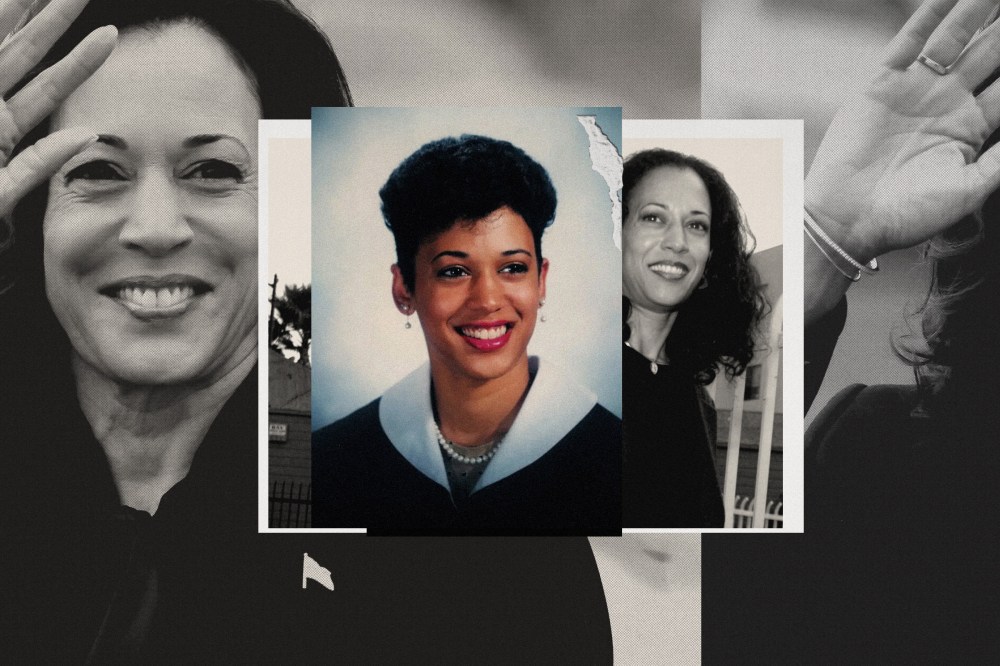Vice President Kamala Harris has embraced a variety of vibes during her still nascent 2024 campaign, but one area where she restrains herself is discussing her race and gender. She doesn’t mention it much on the campaign trail. During her nomination speech at the Democratic National Convention, she declined to call attention to those identities outside the typical introduction politicians give when describing where they come from. In recent campaign ads, Harris is described as the middle-class “daughter of a working mom.” The class description renders her ordinary, and there is no attempt to pique interest over the historic implications of her candidacy as a woman of color.
Harris’ reluctance to draw extra attention to her womanhood or her Black and South Asian ancestry has stood in stark contrast to Hillary Clinton’s 2016 presidential campaign. At the Democratic National Convention that year, a video screen displayed a montage of all past presidents, and then Clinton emerged to the sound of shattering glass. “I can’t believe we have just put the biggest crack in that glass ceiling yet!” she said in the video, prompting the crowd to erupt into roars. During her nomination acceptance speech, she wore a white pantsuit in a nod to the suffragettes, and she trumpeted how her nomination marked a “milestone” for women. Clinton’s most memorable campaign slogan, “I’m With Her,” highlighted her gender — and nothing else.
Harris’ victory wouldn’t in and of itself usher in widespread change for people from marginalized backgrounds. Only policies can do that.
Harris’ choice to go a different path is wise — and she should stay the course. The uniqueness of her identity as a presidential candidate is self-evident, and she should continue to let Republicans, who’ve come up with a preposterous new birther theory, hang themselves with their own rope with their bigoted fixation on her gender and racial background. But beyond tactical questions, Harris’ lack of interest in drawing attention to the “historic” nature of her candidacy is substantively appropriate, too. Harris’ victory wouldn’t in and of itself usher in widespread change for people from marginalized backgrounds. Only policies can do that.
This isn’t an argument that Harris should conceal or whitewash her identity. Harris, the daughter of an Indian mother and a Jamaican father, should feel free to discuss and cherish any aspect of her background, just as any citizen in our multicultural democracy should feel free to. And if the context calls for it, it makes sense for her to elucidate how her identity helps explain her ideological outlook. Harris did this artfully in her DNC speech by recounting how her mother, a “5-foot-tall brown woman with an accent,” was sometimes mistreated but “never lost her cool” and taught Harris to “never complain about injustice but do something about it.” Her recollection of another lesson from her mother hints at her own “show, don’t tell” attitude toward discussing her identity: “‘Never let anyone tell you who you are. You show them who you are.’”

What’s less advisable is making her identity a rallying cry. It may excite certain voters to know they’re contributing to a historic “first” and helping normalize the idea of women and people of color in top positions of power. But other constituencies will be indifferent to — or possibly even alienated by — such messaging; the point of an election is to fix voters’ problems, not help a candidate accrue historical acclaim.
And in a contest wherein one is trying to win over as many voters as possible across every demographic in the nation, what is the value-add of emphasizing to voters something that they can already observe with their own eyes? This is all the more important in light of Harris’ abbreviated campaign, which will be only three months long. Her chief responsibility is to explain what she believes and what she plans to do with her power if elected. Emphasis on “firsts” can flip the focus from voters onto the candidate. Consider how Clinton’s deplorable “I’m With Her” slogan got it backward: The president is supposed to be with us, not the other way around.













